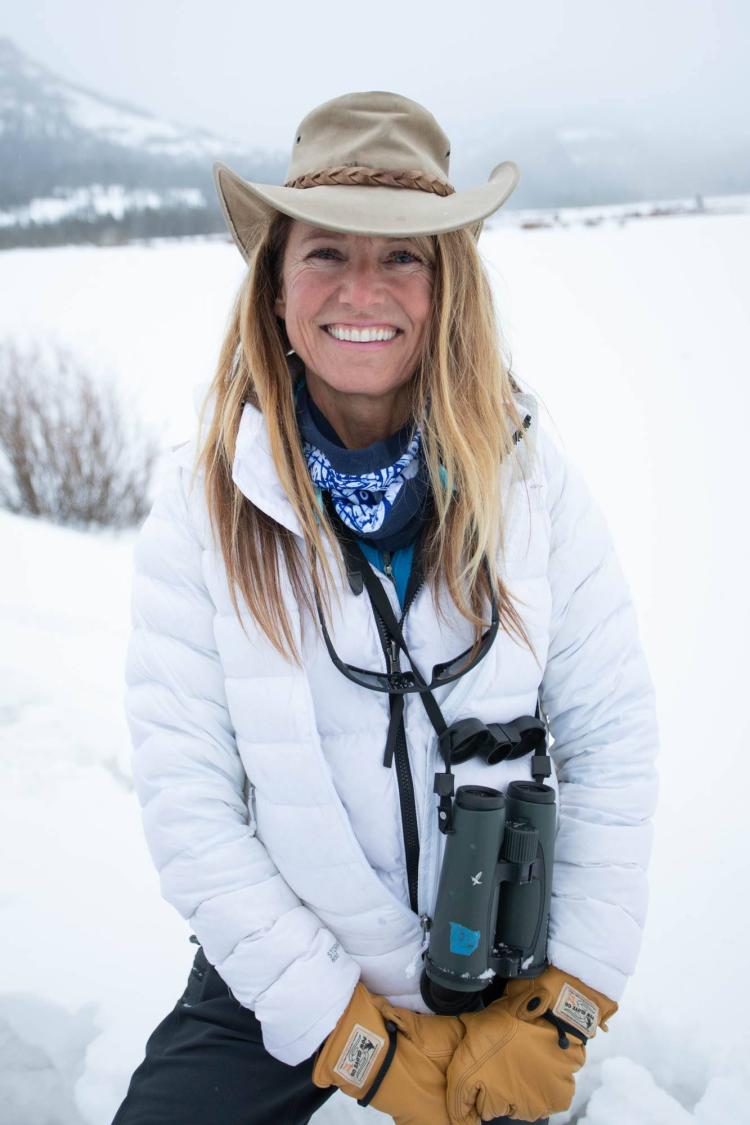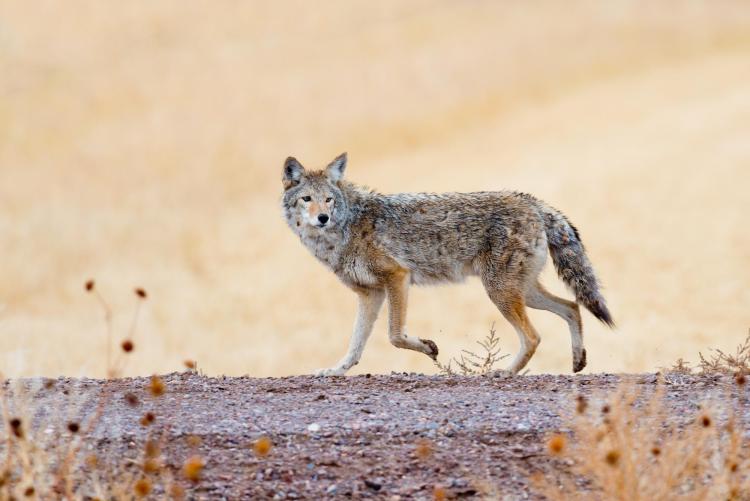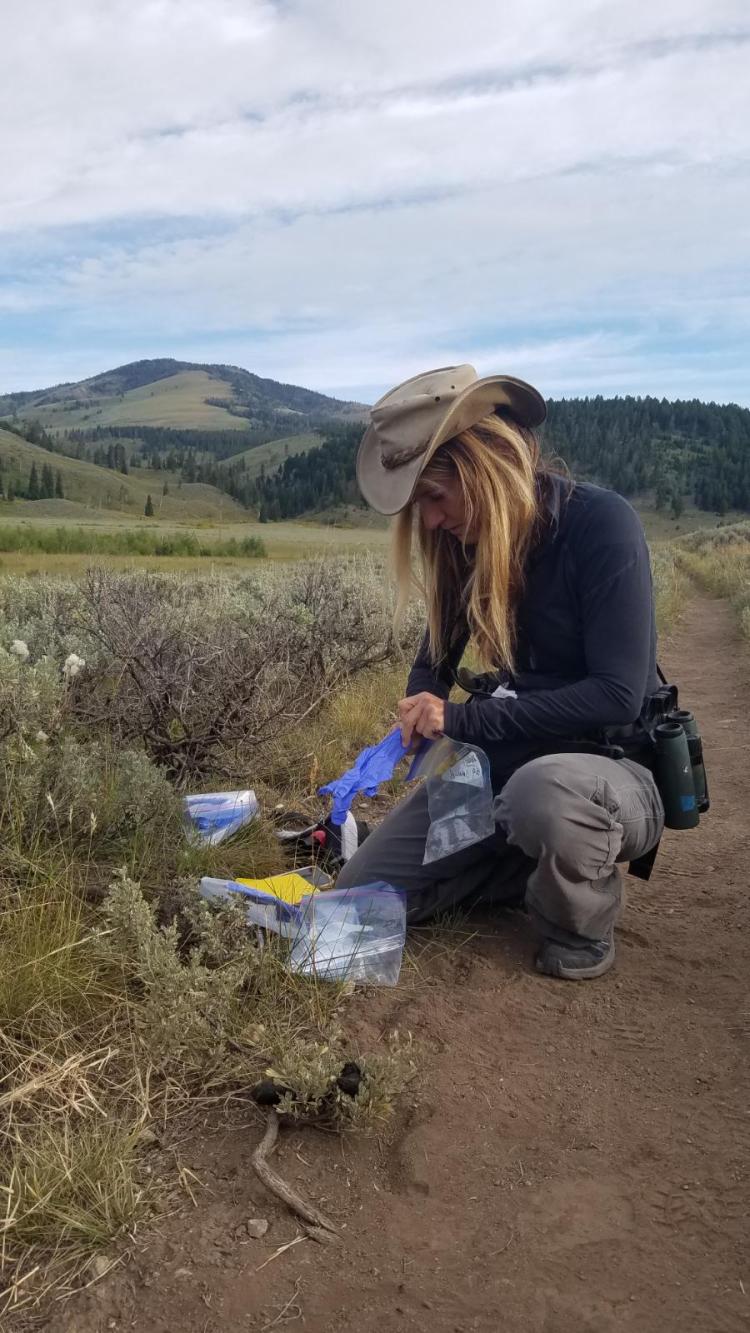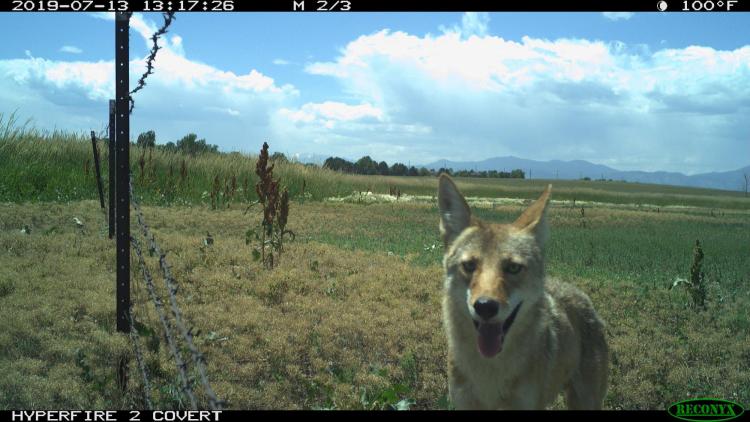Learning to live with fear
Joanna Lambert’s research in evolutionary biology carries lessons for coexisting with coyotes, COVID-19 and each other
In spring of 2020, as people across the world suddenly spent more time at home, they collectively experienced something unusual: wild animals roaming around their neighborhoods in ways they’d never before seen.

Joanna Lambert
While some viral internet sensations never actually happened—like the swans and dolphins that supposedly reappeared in Venetian canals—mountain lions did indeed walk through empty, snowy streets in broad daylight in Boulder. Wild goats took over the Welsh town of Llandudno.
Even squirrels, raccoons, pigeons and deer became enjoyable sightings in many U.S. cities where they are considered pests, threats to one’s garden or automobile.
“I think it’s wonderful how people have just found joy—a silver lining, if you will, in this pandemic—in watching wildlife do things that they don’t normally do, because now suddenly humans aren’t around,” said Joanna Lambert, a professor in environmental studies at the University of Colorado Boulder. “It builds an awareness of wildlife in a way that we haven’t had previously, and awareness with the fact that we share this planet.”
Lambert is an expert in evolutionary biology and most recently has been researching rapid evolution or the “biology of resilience,” studying why certain animals do well in human environments. While many human city dwellers find squirrels, coyotes and raccoons bothersome, Lambert finds them encouraging.
“I am fascinated with the story of how some of species are doing well in areas that are human-dominated, despite what we do,” Lambert said.
Lambert grew up in major urban cities: first in Oxford, England, then in Chicago. But one of her earliest memories is a kind of peace she found in wilder places.
We can’t go on killing everything that scares us in our backyard—we’ve got to work towards coexistence.”
She also loved animals as a kid, but it didn’t occur to her until college that she could study them for a career. And that’s when she received the opportunity of a lifetime.
“I was the undergrad that volunteered for everything,” Lambert said. “I did that so much that at the end of my undergrad, I had a professor say to me, ‘You know, Lambert, you’ve paid your dues. I’m looking for a field assistant. I’m going to Africa. Would you like to come with me?’”
So she packed her bags, and, all on her own and with no experience, headed to a place she’d never been.
Her destination? Kibale Forest (now a national park), a high-altitude rainforest in the Rwenzori Mountains of western Uganda, bordering the Democratic Republic of Congo. There, she joined her professor to conduct research in a place that had the world’s highest density and species richness of primates, including chimpanzees, red-tailed monkeys and black-and-white colobus monkeys.
Saying she went off the grid is an understatement.
“It was epic. There weren’t even fax machines,” Lambert said. “It was a whole different era in travel and communication.”
There also was no electricity, no water except rainwater, and during her three months there, almost everything that could go wrong did go wrong.
“You’d think I’d never go back,” Lambert said. “It was the hardest thing I’ve ever done. But it not only met every one of my expectations, it exceeded them.”
She has returned at least once a year to continue her research.

Turning grief into hope

Joanna Lambert
After spending almost 30 years in Kibale National Park, Lambert has come to know that forest in a way that she’s known no other place on the planet.
She has also seen the local human population more than triple and observed an accelerated version of what’s happened around the planet for the past few hundred years: Human quality of life has drastically changed, and the biodiversity and abundance of flora and fauna has greatly diminished.
As she observed the loss of wildlife she was studying, Lambert began to notice something changing within herself.
“Every time I came home, it was taking me longer and longer to get over it,” she said. “I realized that I was experiencing this kind of existential loss—something that has now been discussed by some psychologists, called ecological grief.”
Since Lambert joined CU Boulder in 2015, this feeling has made her think about ways of maintaining hope on a planet that has undergone extraordinary change and loss.
What she found in both Africa and North America is that some species thrive in human-dominated spaces and are resilient. For example, even as human populations grew and habitat was shrank, baboons became more common around Kibale National Park.
She saw similar trends in North America, where coyotes have become a common sight across the western United States and can sometimes be a danger to peoples’ pets.
“It started me thinking about, what is this process of resilience? What is this process of adapting to human landscapes? And can we use that to inform the ways in which we are managing our urban and suburban landscapes and the species that live in them?”
Lambert has been researching coyotes in two differing settings: where there are and where there are not wolves. By studying behavior and genetics, she aims to find out whether coyotes undergo rapid evolution when they live in urban human spaces, where there are intensive human, pressures, different kinds of foods and no natural predators.
Lambert has found that creatures that thrive in human environments tend to share the same kinds of traits that have made us successful and widespread as a species: being able to eat a wide variety of foods, to adapt behaviorally to new environments, and a high ability to learn quickly and teach their offspring. Many of these animals can reproduce quickly, as well.
We know these animals—raccoons, squirrels, rabbits, pigeons—and we often view them as too familiar, as nuisances in our cities.
“There’s an old expression of ‘familiarity breeds contempt,” said Lambert. “But COVID-19 has reopened our eyes to our backyard and urban animal neighbors.”
Learning to coexist
For Coloradans, these urban animal neighbors can also breed fear. Simply letting the dog out in the backyard could result in a dangerous encounter with coyotes.
“There are some species that historically have evoked a lot of fear in humans,” Lambert said. “When black bears, mountain lions or coyotes start coming into our world, it can feel threatening. And often, the way that we deal with that fear is just to kill the things that make us scared.”

A coyote smiling at a camera trap in Broomfield, Colorado.
But, she said, “we can’t go on killing everything that scares us in our backyard—we’ve got to work towards coexistence.”
Modern humans have been around on the planet for at least 150,000 years. And throughout all of our history we have lived alongside large-bodied predators.
We lost that knowledge only very recently, Lambert said. She argues that we must do three things to coexist with coyotes and other threats, like COVID-19.
One, become habituated to the novelty of these threats. At first, living near large predators or in a world with a new virus will seem quite scary, but it will seem less threatening with time and exposure.
Two, regain the knowledge of how to live around top predators and other threats. For example, in parts of Europe where wolves are coming back, some residents use guard dogs. With COVID-19, face masks that have long been a common courtesy in Asia have now been adopted globally, sometimes reluctantly.
And finally, we need to change our behavior, Lambert said. She likens leaving the house in 2020 without a mask to naïvely approaching a black bear and her cubs—a failure to apply knowledge about a situation and adjust behavior accordingly.
While we still don’t fully understand COVID-19, that doesn’t mean we can’t change our behavior with the scientific knowledge we do have, Lambert said.
Lambert is ever-optimistic. As she has watched the world around her change drastically in the past 30 years, as well as in just the past year, she sees an opportunity to understand things we don’t yet comprehend—whether that’s how to live with coyotes in our cities, a novel virus or simply each other.
Coping with fear is key. “When people look out and realize how much we have done to our planet, that scares a lot of people,” Lambert said. “But I think we’ve got to have hope.”
Joanna Lambert will be speaking about her research at the upcoming CU on the Weekend lecture series. Learn more about the event, including registration details, on the Office for Outreach and Engagement's website.

